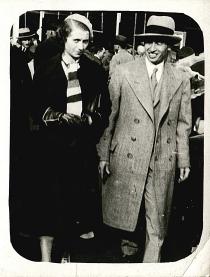This is Etel and her husband. It must have been around 1934 or 1935; this is their wedding picture. I think their wedding took place in the synagogue in Bethlen Square. I don't remember it though, maybe I wasn't even there. Maybe I was pregnant with Judit, but I'm not sure.
My sister, Etel, did one year at a commercial college and it included a course on typing and shorthand; before that, she did four years of middle school. Before the war, she worked in an office, in a big joiner's workshop. Etel's husband was called Jozsef Schneller, and he was from Vanyarc. He was born in 1905. I don't know, where they met, because, when I got married at the age of 17, I became distant from my family. Etel had a completely different circle of friends to me. Her husband was a tailor and became Dad's partner. He was related to my step-mother somehow. In 1936, Agi was born, they only had that one child. They always lived with my parents, even on Almassy Square.
During the war, Etel's husband was also taken to do forced labor. He died in Fertorakos. I was together with Etel during deportation. My sister Etel left [Hungary] on 5th January 1957. She fled across the border with her daughter and her boyfriend. My sister's boyfriend was married. Then he completely disappeared in Australia. Supposedly, he came back to Hungary. Originally, they wanted to go to America. They were in a refugee camp in Vienna. They had a letter of invitation to America already. Auntie Netka's elder daughter already lived there. The official invitation was from them, saying they would receive them. America closed the quota though, so they couldn't go. Then somebody in the camp drew their attention to the fact that a boat was preparing to leave for Australia, and they applied for it.
She never worked in Sydney. Occasionally she sewed, but later she just managed the household. She always used to say that she loved Australia, because she never paid a penny in taxes, but she receives a pension anyway. She learnt English; they needed to speak English in order to obtain citizenship. She did speak English, but not very well. She had many English-speaking acquaintances and card-partners and she could arrange anything she had to in English. She had been reading English-language books for many years. I sent her Nok Lapja, and Fules, because she really liked to solve the crosswords, and I also sent books. Every year, I sent her at least two packages of books. I always wrote to her. Less frequently first of all, but from the 1960's, regularly. A letter would come from there and I 'd answer straight away.
She has just died. This year [2003] in October, she would have turned 90. She was buried in a Jewish ceremony in Sydney.


















































